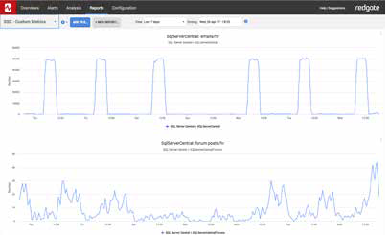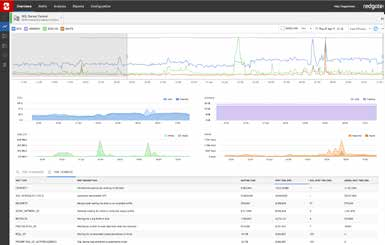Metrics install automatically if you have Redgate Monitor installed.
If you are using Redgate’s SQL Server monitoring tool, Redgate Monitor, you can instantly install and run this metric on your servers.
Explanation: This is a general indicator of performance problems. Index fragmentation can affect the rate of return for moderate to large tables. If multiple indexes are fragmented throughout the database, then an index maintenance strategy needs to be evaluated.
Guideline values:The ideal value for this metric is less than 5%; this metric counts the number of moderate to large indexes (page values > 100) with fragmentation levels greater than 5%, and then divides that number by the number of indexes in the database. This percentage may increase throughout the day as data is loaded into your database, but it will shrink when indexes are rebuilt or reorganized. This metric does not identify specific performance problems with a specific index, but should be used to obtain a general idea of how well your index maintenance strategy addresses overall problems.
Possible solutions: If this value indicates an increased amount of index fragmentation throughout your database, you may need to fine-tune your index maintenance plans. Indexes may need to be redesigned or rebuilt more frequently.
More information:
sys.dm_db_index_physical_stats (Transact-SQL)
Reorganize and Rebuild Indexes
Metric definition
Name
Percentage of fragmented indexes
Description
Explanation: This is a general indicator of performance problems. Index fragmentation can affect the rate of return for moderate to large tables. If multiple indexes are fragmented throughout the database, then an index maintenance strategy needs to be evaluated.
Guideline values: The ideal value for this metric is less than 5%; this metric counts the number of moderate to large indexes (page values > 100) with fragmentation levels greater than 5%, and then divides that number by the number of indexes in the database. This percentage may increase throughout the day as data is loaded into your database, but it will shrink when indexes are rebuilt or reorganized. This metric does not identify specific performance problems with a specific index, but should be used to obtain a general idea of how well your index maintenance strategy addresses overall problems.
Possible solutions: If this value indicates an increased amount of index fragmentation throughout your database, you may need to fine-tune your index maintenance plans. Indexes may need to be redesigned, or rebuilt more frequently.
More information:
The T-SQL query that will collect data
Instances to collect from
Select all
Databases to collect from
0
Collection frequency
86400
Note: Excessively large databases may not return data within an acceptable time frame, so you may need to adjust the collection frequency of this metric from 1 minute to 5 or 10 minutes.
Use collected or calculated values
Leave the Use a calculated rate of change between collections check box unchecked
Metric collection
Enabled
Alert definition
Alert name
Increased % of fragmented indexes
Description
Explanation: This alert is raised when index fragmentation goes above the threshold specified. This is a general indicator of performance problems. Index fragmentation can affect the rate of return for moderate to large tables. If multiple indexes are fragmented throughout the database, then an index maintenance strategy needs to be evaluated.
The ideal value for the metric on which this alert is based is less than 5%; the metric counts the number of moderate to large indexes (page values > 100) with fragmentation levels greater than 5%, and then divides that number by the number of indexes in the database. This percentage may increase throughout the day as data is loaded into your database, but it will shrink when indexes are rebuilt or reorganized. This metric does not identify specific performance problems with a specific index, but should be used to obtain a general idea of how well your index maintenance strategy addresses overall problems.
Possible solutions: If this value indicates an increased amount of index fragmentation throughout your database, you may need to fine-tune your index maintenance plans. Indexes may need to be redesigned or rebuilt more frequently.
More information:
Raise an alert when the metric value goes
Above the defined threshholds
Default threshold values
| High: | 15 |
| Medium: | 10 |
| Low: | 5 |
Note: These thresholds are intended as guideline values. If they seem too high or too low for your environment, replace them with values more suited to your server performance.
Raise an alert when the threshold is passed for
1 collection
Alert is
Enabled
 29,244
29,244 
